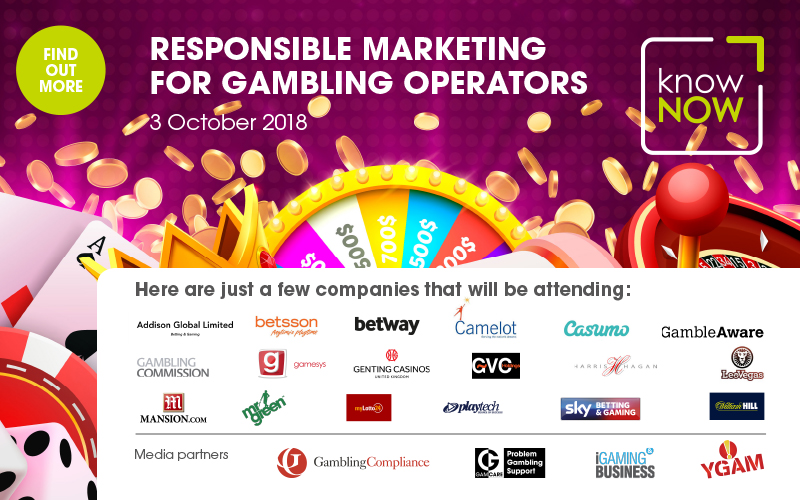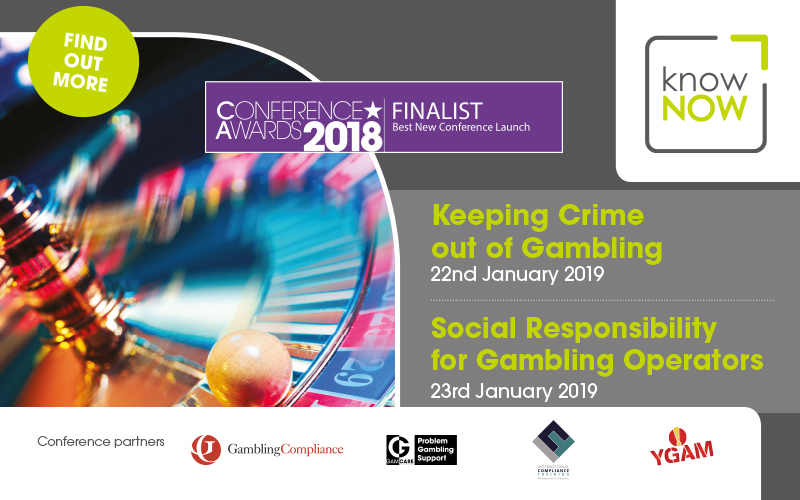Responsible Gambling is a complex issue
Only a week until the next KnowNow conference, Responsible Marketing for Gambling Operators. Here’s our founder and MD, Paula, with her thoughts on recent news…

Britain’s hidden epidemic.
Last week Tom Watson, The Labour Party Deputy Leader and Shadow Secretary of State for Digital, Culture, Media and Sport, put forward Labour’s plans to help curb problem gambling in the UK. Watson has previously described problem gambling as “Britain’s hidden epidemic”. In turn this phrase was jumped on and adopted by the press with some fervour.

The plans can be broken down as follows;
- A whistle to whistle ban on gambling advertising during live sport
- A compulsory 1% levy on operators to fund research, education and treatment of problem gambling
- New clinical guidelines and increased resources to improve NHS addiction / mental health services
- A ban on using credit cards to bet
- New rules to allow people to block gambling transactions at account level
Gambling Commission statistics suggest that as many as 430,000 people in the UK are problem gamblers. A report by IPPR and GambleAware estimated the current cost to the taxpayer to deal with the problem at around £1.2billion. However West London is home to the only specialist NHS clinic for problem gamblers in England and Wales.
Watson claims that current regulations “were not up to the job of protecting addicts”. Furthermore he added that “Gambling companies have to take more responsibility for the harm caused by their products and contribute more to research and treatment.”
On the face of it, I don’t think many rational people would have any major problems with much of what Watson is proposing. It’s clear that NHS provision for treatment of problem gambling is woefully inadequate. When I visit my GP I get asked questions about how much alcohol I drink and do I smoke. Nobody has ever asked me anything related to any potential behavioural addiction issues.
Player Protection.
Most gambling operators do take the issues of player protection very seriously indeed. Richard Flint CEO of Sky Betting and Gaming came out in support of the idea of a higher levy. However he questioned the validity of a blanket ban on credit cards. He told BBC News “our data on credit cards suggests that it is those customers with multiple cards that are at greater risk of harm. So we believe that greater attention should be placed on that rather than a complete ban.”
In relation to self excluding from gambling transactions at bank account level, there are projects in place looking at this very issue. Natalie Ledward, Vulnerable Customer Specialist for Monzo Bank will actually be joining a panel at KnowNow’s Social Responsibility for Gambling Operators on 23rd January to talk about the facility they have introduced that does this very thing. Last time I spoke to Natalie initial sign ups for their scheme were very promising.
Gambling Advertising.
Gambling advertising is a key concern right now. Delegates will be joining us in London next week at our event Responsible Marketing for Gambling Operators to discuss all the issues around promotional activities. Gambling Commission changes to the LCCP come into effect from 31st October in the UK.
We have to recognise however that this is the tip of the iceberg. Will Ridley, brand executive at Sky Betting & Gaming and chair of the Young People and Student Advisory Group for YGAM will be speaking at the event next week. He previously told me
“Protecting young people with age-related marketing content and adverts that do not appeal to children is just the start. It’s time for us to open the debate with young people around how they use smart phones and what content they see.”
Gambling and Gaming.
He really does have a point here. This is reinforced by the fact that fifteen international regulators have joined force to look at the risks created by the blurring of the lines between gambling and gaming. Gaming manufacturers currently sit outside of regulatory requirements in the UK. This means young people have free access to a plethora of video games featuring skins gambling and loot boxes.
My worry here is that I don’t believe it is possible to simply regulate our way out of problem gambling. Nobody likes the idea of being governed by a nanny state. Plus we all know that in reality over regulation can often lead to an increase in illegal, black market activity. There is an argument that you could end up handicapping responsible providers and in doing so enabling a cohort with less scruples.
There are a number of issues that we are trying to tackle as one. But there are a number of stakeholders that need to be involved. Simply vilifying the gambling operators, as seems to be the folly of the mainstream media isn’t helpful either.
My experience of working with the industry is that operators want to get involved and find solutions to these problems. I know that most of the people I speak to in my working life are the operators who care. That’s because I run a business that focuses on ethics and player protection. If you’re an operator that isn’t interested in that then you are unlikely to be breaking bread with me. But the majority are getting involved in the conversations and working very hard to address these issues.
Forthcoming KnowNow Conferences.
There is still time to join us at Responsible Marketing for Gambling Operators next week and plans are well and truly underway for Keeping Crime Out of Gambling and Social Responsibility for Gambling Operators in January.





